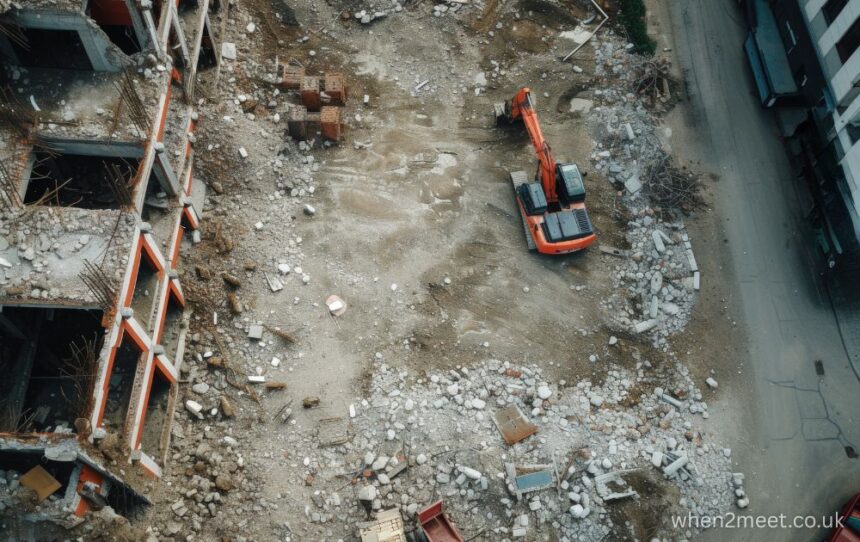Taking on a large-scale repair or demolition project is no small task. Whether it involves tearing down part of a home, removing outdated structures, or preparing public infrastructure for improvements, there are countless details that must be considered long before the first hammer swings. Planning properly can prevent costly delays, safety hazards, and unexpected setbacks. Just as importantly, good preparation helps ensure that the finished result stands the test of time. Homeowners and municipalities alike need to weigh regulations, budgets, and long-term goals carefully to make informed decisions. This article will break down the key elements to keep in mind when preparing for projects of this scale and highlight why working with professionals is essential. From initial assessments to safety, permits, and costs, the foundation of a successful project is always thorough planning, supported by expertise in areas like reliable manhole repair in the US.
Start with a Thorough Assessment
Every successful repair or demolition project begins with understanding the current condition of the structure. Skipping this step often leads to surprises halfway through, when hidden issues suddenly appear and throw schedules off track. For homeowners, this could mean discovering that a wall is load-bearing or that hazardous materials, such as asbestos, exist in the property. For municipalities, assessments help determine whether a manhole, street section, or underground structure should be repaired, replaced, or upgraded entirely.
Evaluations also give project managers a realistic sense of the scope of work. This clarity is vital when it comes time to allocate funds, schedule workers, and coordinate equipment. A proper assessment is more than just a walkthrough. It involves inspections, professional reports, and sometimes even lab testing. The more detailed the information at this stage, the fewer surprises you’ll face down the road.
Understand the Role of Safety and Compliance
Safety should never be treated as an afterthought. Construction and demolition are inherently dangerous fields, and the risks only increase when large structures or underground systems are involved. Falling debris, unstable foundations, and exposure to toxic materials are all possible hazards. Workers and bystanders alike are put at risk if safety is not prioritized.
Equally important is compliance with building codes and regulations. Every jurisdiction has its own rules about what can be removed, what must be preserved, and how waste should be handled. Municipal projects often require public notice, approval from city councils, and coordination with utility companies. At the residential level, homeowners may need permits for even relatively small demolitions. Skipping these steps can result in hefty fines, project delays, or even the need to redo work. By recognizing that safety and compliance are foundational pillars of planning, project leaders set themselves up for smoother execution.
Choose Contractors with Proven Experience
When it comes time to move forward, the choice of contractor can make or break the project. Experience and reputation matter because demolition and repair require more than just strength and equipment. They demand knowledge, precision, and the ability to adapt to unexpected challenges. A seasoned team will anticipate complications, communicate clearly about timelines, and offer creative solutions when problems arise. They will also understand the importance of minimizing disruption, whether that means reducing dust in a home setting or keeping a busy street open while infrastructure repairs take place.
Contractors should also provide detailed proposals, outlining the scope of work, projected costs, and expected timelines. Transparent communication builds trust and helps both parties manage expectations. Whether you’re a homeowner preparing to renovate or a city department tasked with infrastructure upgrades, the right contractor acts as a partner rather than just a service provider. For home-focused projects, it pays to trust rose city home demolition to handle the work with professionalism and care.
Budget Beyond the Basics
Money is often the most sensitive part of any large project. Initial estimates rarely cover every possible expense, which is why building a realistic budget is so crucial. Demolition and repair often uncover hidden conditions. A wall may reveal water damage, a foundation may show signs of cracking, or an underground manhole may need more extensive work than anticipated. These surprises can quickly add thousands of dollars to the cost if there is no contingency fund.
A strong budget doesn’t just include labor and materials. It also accounts for permits, waste removal, equipment rentals, safety gear, and post-project clean-up. For municipalities, additional costs may include rerouting traffic, hiring inspectors, or coordinating with utility companies. For homeowners, there might be temporary housing expenses if the project makes the house unlivable for a short time. Planning for these possibilities helps keep stress to a minimum when the unexpected happens.
Plan for Minimal Disruption
Even the best-planned project will cause some level of disruption. The question is how to minimize its impact. On a residential property, this may mean scheduling work during the day when occupants are at work or school, or taking extra precautions to reduce dust and noise. For municipal work, the challenge is even greater. Road closures, detours, and noise can affect hundreds or even thousands of people. Clear communication with the public is vital to maintain goodwill and reduce frustration.
Technology can also play a role in reducing disruption. Modern equipment is often quieter, faster, and more efficient. Similarly, new repair techniques in infrastructure can extend service life while minimizing downtime. Choosing professionals who stay up to date with industry best practices ensures projects are completed not only safely but also with consideration for the people affected.
Large-scale repairs and demolitions are never as simple as they look on the surface. Each project requires careful thought, compliance with regulations, and a commitment to safety and quality. From assessing the existing conditions to choosing the right contractors, every decision matters. For homeowners, working with trusted professionals ensures a smoother experience and a better final result. For municipalities, proper planning supports infrastructure that serves communities for decades. No matter the size of the job, success is built on preparation, communication, and expert execution. When the time comes to start, remember that the foundation of every great project lies in the details planned long before the work begins.
Read more interesting topic: Best Pipe Repair Solution.



